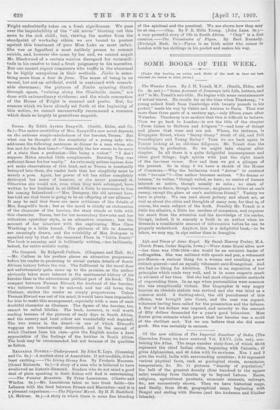The Compact. By Ridgwell Cullum. (Chapman and Hall. 6s.) —Mr.
Cullum in his preface places an attractive programme before his reader in promising to reveal certain details of South African history before the war. 'rho fulfilment in the novel does not unfortunately quite come up to the promise, as the author obviously takes more interest in the sentimental history of his heroine than in the adventurous political part of his book. The compact between Ferman Elwood, the husband of the heroine, who believes himself to be unloved, and her old lover, Guy Chaliner, strikes the reader as simply preposterous. Unless Ferman Elwood was out of his mind, it would have been impossible for him to make this arrangement, especially with a man of such doubtful character as Chalmer. The figure of the heroine, too, cannot be called lifelike. The book, however, is well worth reading because of the pictures of early days in South Africa, and the scenery and local colour are wonderfully well depicted. The two scenes in the desert—in one of which Elwood's waggone are treacherously destroyed, and in the second of which. Chalmer loses his oxen—give the English reader a keen appreciation of the feelings of the trekker in South Africa. The book may be recommended, but not because of its qualities as fiction.






































 Previous page
Previous page